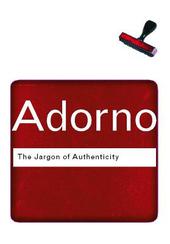
|
The Jargon of Authenticity
Paperback
Main Details
| Title |
The Jargon of Authenticity
|
| Authors and Contributors |
By (author) Theodor W. Adorno
|
| Series | Routledge Classics |
|---|
| Physical Properties |
| Format:Paperback | | Pages:176 | | Dimensions(mm): Height 198,Width 129 |
|
| Category/Genre | Phenomenology and Existentialism |
|---|
| ISBN/Barcode |
9780415289917
|
| Classifications | Dewey:142.78 |
|---|
| Audience | | Undergraduate | | Postgraduate, Research & Scholarly | | Professional & Vocational | |
|---|
| Edition |
2nd Revised edition
|
|
Publishing Details |
| Publisher |
Taylor & Francis Ltd
|
| Imprint |
Routledge
|
| Publication Date |
5 September 2002 |
| Publication Country |
United Kingdom
|
Description
Theodor Adorno was no stranger to controversy. In The Jargon of Authenticity he gives full expression to his hostility to the language employed by certain existentialist thinkers such as Martin Heidegger. With his customary alertness to the uses and abuses of language, he calls into question the jargon, or 'aura', as his colleague Walter Benjamin described it, which clouded existentialists' thought. He argued that its use undermined the very message for meaning and liberation that it sought to make authentic. Moreover, such language - claiming to address the issue of freedom - signally failed to reveal the lack of freedom inherent in the capitalist context in which it was written. Instead, along with the jargon of the advertising jingle, it attributed value to the satisfaction of immediate desire. Alerting his readers to the connection between ideology and language, Adorno's frank and open challenge to directness, and the avoidance of language that 'gives itself over either to the market, to balderdash, or to the predominating vulgarity', is as timely today as it ever has been.
Author Biography
Theodor Adorno (1903 - 1969). German philosopher who was a leading member of the Frankfurt School. Adorno led an influential attack on the "culture industry" prevalent in contemporary capitalist society.
|